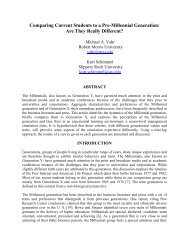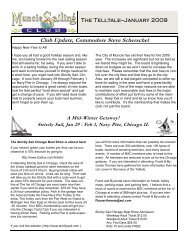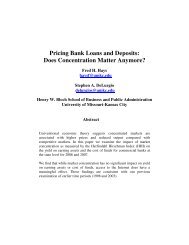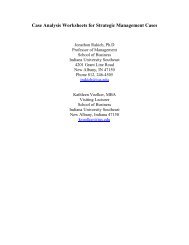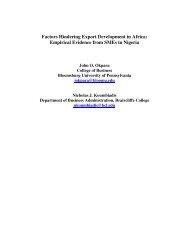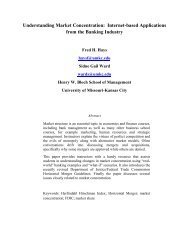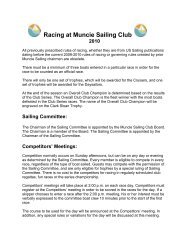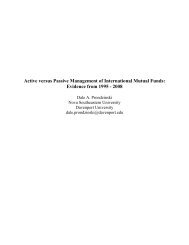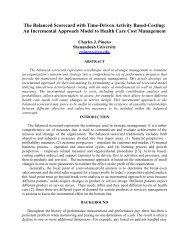ISO 14000 Standards and Environmental Performance Index: A ...
ISO 14000 Standards and Environmental Performance Index: A ...
ISO 14000 Standards and Environmental Performance Index: A ...
You also want an ePaper? Increase the reach of your titles
YUMPU automatically turns print PDFs into web optimized ePapers that Google loves.
comparative data on the indexes is expected to provide trends towards effective<br />
environmental management.<br />
<strong>ISO</strong> <strong>14000</strong> <strong>and</strong> <strong>Environmental</strong> <strong>Performance</strong> <strong>Index</strong> for the Indian Steel Industry<br />
<strong>ISO</strong> <strong>14000</strong> provides a model for establishing a management system that is focused on<br />
controlling <strong>and</strong> improving a company's impacts on the environment. Effectively applied,<br />
<strong>ISO</strong> 14001 promises cost savings, waste reduction, energy efficiency, resource<br />
productivity, <strong>and</strong> improvements in public relations <strong>and</strong> liability. It shares common<br />
management system principles with <strong>ISO</strong> - 9000 series of quality system st<strong>and</strong>ards i.e.<br />
policy, planning, implementation <strong>and</strong> operation, monitoring <strong>and</strong> corrective action <strong>and</strong><br />
management review.<br />
The family of environmental st<strong>and</strong>ards <strong>ISO</strong> <strong>14000</strong> was developed by the <strong>ISO</strong> Technical<br />
Committee <strong>ISO</strong>/TC207 <strong>and</strong> published in September 1996. Formally adopted in 1996 by<br />
the International Organization of St<strong>and</strong>ardization, <strong>ISO</strong> <strong>14000</strong> represents a new voluntary<br />
international environmental st<strong>and</strong>ard, which will likely be adopted by the vast majority of<br />
corporations in India. Its major focus is on the structure, implementation, <strong>and</strong><br />
maintenance of a formal environmental management system. In this article, we use case<br />
studies of steel plants in India <strong>and</strong> discuss some variables that may be used to attain <strong>ISO</strong><br />
<strong>14000</strong> certification. It is a case in point that the various steel plants in India have already<br />
undertaken voluntary measures that go beyond the scope of compliance. This is their<br />
journey towards certification of <strong>ISO</strong> <strong>14000</strong>.<br />
When <strong>ISO</strong> <strong>14000</strong> was introduced, following the Rio Summit, India being a signatory of<br />
GATT (General Agreement on Tariff <strong>and</strong> Trade) was compelled by exogenous factors to<br />
implement <strong>ISO</strong> <strong>14000</strong> stipulations in its economic gamut. Many companies viewed the<br />
new international st<strong>and</strong>ard as a natural extension of the quality management system. Just<br />
as total quality management (TQM) dem<strong>and</strong>s a goal of zero defects, as they are clear<br />
indicators of inefficiency in the design of processes <strong>and</strong> products <strong>and</strong> services, similarly<br />
the new approach, total quality environmental management, considers every<br />
environmental impact as an indicator of inefficiency in the use of materials <strong>and</strong> energy. It<br />
aims to improve efficiency <strong>and</strong> quality by eliminating emissions, effluents <strong>and</strong> accident.<br />
This new concept of sustainable development has been applied in this paper to develop a<br />
comprehensive approach of the issues related to production of steel with particular<br />
reference to steel plants in India; the objective is to develop an <strong>Environmental</strong><br />
<strong>Performance</strong> <strong>Index</strong> that will inculcate a spirit of resources utilization in an environment<br />
friendly manner <strong>and</strong> providing environmental protection.<br />
The <strong>Environmental</strong> <strong>Performance</strong> <strong>Index</strong> suggested in this paper is developed on the<br />
philosophy of the <strong>ISO</strong> <strong>14000</strong> series goes beyond mere compliance with environmental<br />
legislation. It encourages a systematic examination of all areas where an organization’ s<br />
activities have an impact on the environment <strong>and</strong> can yield bottom-line benefits such as<br />
reduced waste <strong>and</strong> savings in consumption of energy <strong>and</strong> materials.



